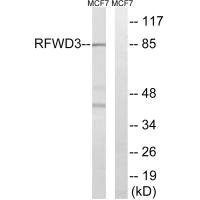RFWD3 Antibody
-
货号:CSB-PA041555
-
规格:¥2024
-
图片:
-
其他:
产品详情
-
产品名称:Rabbit anti-Homo sapiens (Human) RFWD3 Polyclonal antibody
-
Uniprot No.:Q6PCD5
-
基因名:RFWD3
-
宿主:Rabbit
-
反应种属:Human
-
免疫原:Synthesized peptide derived from internal of Human RFWD3.
-
免疫原种属:Homo sapiens (Human)
-
克隆类型:Polyclonal
-
纯化方式:The antibody was affinity-purified from rabbit antiserum by affinity-chromatography using epitope-specific immunogen.
-
浓度:It differs from different batches. Please contact us to confirm it.
-
产品提供形式:Liquid
-
应用范围:ELISA,WB
-
推荐稀释比:
Application Recommended Dilution WB 1:500-1:3000 -
Protocols:
-
储存条件:Upon receipt, store at -20°C or -80°C. Avoid repeated freeze.
-
货期:Basically, we can dispatch the products out in 1-3 working days after receiving your orders. Delivery time maybe differs from different purchasing way or location, please kindly consult your local distributors for specific delivery time.
相关产品
靶点详情
-
功能:E3 ubiquitin-protein ligase required for the repair of DNA interstrand cross-links (ICL) in response to DNA damage. Plays a key role in RPA-mediated DNA damage signaling and repair. Acts by mediating ubiquitination of the RPA complex (RPA1, RPA2 and RPA3 subunits) and RAD51 at stalled replication forks, leading to remove them from DNA damage sites and promote homologous recombination. Also mediates the ubiquitination of p53/TP53 in the late response to DNA damage, and acts as a positive regulator of p53/TP53 stability, thereby regulating the G1/S DNA damage checkpoint. May act by catalyzing the formation of short polyubiquitin chains on p53/TP53 that are not targeted to the proteasome. In response to ionizing radiation, interacts with MDM2 and enhances p53/TP53 ubiquitination, possibly by restricting MDM2 from extending polyubiquitin chains on ubiquitinated p53/TP53.
-
基因功能参考文献:
- The results suggest that RPA phosphorylation enhances the recruitment of PRP19 to RPA-ssDNA and stimulates RPA ubiquitylation through a process requiring both PRP19 and RFWD3, thereby triggering a phosphorylation-ubiquitylation circuitry that promotes ATR activation and homologous recombination. PMID: 28666352
- Single point mutations in the RPA32 subunit of RPA that abolish interaction with RFWD3 also inhibit interstrand crossling repair, demonstrating that RPA-mediated RFWD3 recruitment to stalled replication forks is important for ICL repair. PMID: 28575657
- E3 ligase RFWD3 functions in timely removal and degradation of RPA and RAD51 to allow homologous recombination progression to subsequent steps following mitomycin C damage. PMID: 28575658
- RFWD3-dependent ubiquitination of RPA regulates repair at stalled replication forks. PMID: 26474068
- RFWD3 and RPA2 functionally interact and participate in replication checkpoint control PMID: 21504906
- RFWD3 is recruited to sites of DNA damage and facilitates RPA-mediated DNA damage signaling and repair PMID: 21558276
- Study identifies RFWD3 as a positive regulator of p53 stability when the G(1) cell cycle checkpoint is activated and provides an explanation for how p53 is protected from degradation in the presence of high levels of Mdm2. PMID: 20173098
显示更多
收起更多
-
相关疾病:Fanconi anemia, complementation group W (FANCW): A disorder affecting all bone marrow elements and resulting in anemia, leukopenia and thrombopenia. It is associated with cardiac, renal and limb malformations, dermal pigmentary changes, and a predisposition to the development of malignancies. At the cellular level it is associated with hypersensitivity to DNA-damaging agents, chromosomal instability (increased chromosome breakage) and defective DNA repair (PubMed:28575657). The disease is caused by mutations affecting the gene represented in this entry.
-
亚细胞定位:Nucleus. Nucleus, PML body. Cytoplasm.
-
数据库链接:
HGNC: 25539
OMIM: 614151
KEGG: hsa:55159
STRING: 9606.ENSP00000354361
UniGene: Hs.567525
Most popular with customers
-
YWHAB Recombinant Monoclonal Antibody
Applications: ELISA, WB, IF, FC
Species Reactivity: Human, Mouse, Rat
-
Phospho-YAP1 (S127) Recombinant Monoclonal Antibody
Applications: ELISA, WB, IHC
Species Reactivity: Human
-
-
-
-
-
-





















